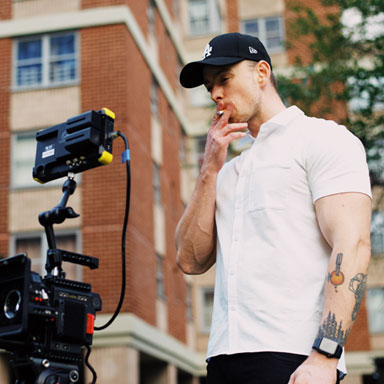fil
‘Just Don’t Think I’ll Scream’
As an independent movie maker, a French partner acquainted me with a vital ordered differentiation: that between a cinephile, an admirer of film, and a cinephage, one who “eats” motion pictures insatiably, aimlessly, fanatically, and is in this manner consumed by them. In Frank Beauvais’ ‘Just Don’t Think I’ll Scream’, a strong, desultory self-portraying paper film, the producer ponders back a difficult time that he tried to enhance with an everyday at-home ingestion of three to five motion pictures a disarranged eating routine that at last couldn’t mollify the disorder he felt inside and without.
‘Just Don’t Think I’ll Scream’-the principal full length project by Beauvais, who, as well as being an independent movie director, has filled in as a music specialist on twelve or more movies primarily narratives. April to October 2016, a period when he observed multiple hundred motion pictures. Beauvais’ narrative comprises exclusively of quiet clasps from those titles, in addition to his voluble diaristic voice-over, which he understands himself. The excerpted independent movie aren’t recorded until the end credits; the list goes from Hollywood and European works independent movie productions to ongoing American free film to industrials to all way of celluloid exotica in the middle. These pieces contain no famous shots, no eminent appearances (looks, when readable, have a place with additional items, to bit players). All things being equal, this thick visual montage is sewed together from negligible fragments: stock shots, embeds, segregated body parts, peculiar articles, irregular scenes. The pictures are coordinated aptly with Beauvais’ words, however some more sideways than others. Once in a while the screen slices to dark briefly, working as a line break in a text could a concise reprieve for overpowered eyes and ears.
While the visual part of ‘Just Don’t Think I’ll Scream’ is described by the unrecognizable, the little known, the sound component adheres as a surge of realities, dates, occasions, clear contemplations and associations. In the independent movie initial minutes alone, I wound up jotting irately to get down the specifics of the task’s beginnings. Beauvais, 45 at that point, had as of late said a final farewell to a sweetheart, with whom he had migrated, six years earlier, to a little village in Alsace-a move that permitted them to be nearer to nature and to live more efficiently than they could in Paris. After the split, however, Beauvais, who doesn’t have a driver’s permit, observes this rustic quality immuring: “I experience this exile, a long way from Paris, here, where the lavishness of nature stows away from the undeveloped eye the Protestant, quite often conservative solidness of its occupants,” he clarifies, his voice imperturbable.
The termination of Beauvais’ friendship generally concurred with the fear based oppressor assaults in Paris in November 2015 and France’s presentation of a highly sensitive situation or, as the producer puts it, the beginning of a period of additional surveillance, “fabricating saints,” and “the sound of boots returning.” By the spring of 2016, he’s almost a hermit: “I don’t see the rest of the world. I attempt to think of it through the independent movie that I see constantly.” His independent movie ‘Bulimia” structures his days-or if nothing else sits back except for appears to offer little joy. “Anything goes, and I can’t stop,” he admits. In three days, Beauvais downloads 100 Soviet movies.
As Beauvais describes his gloom, his inclination like “an unsound, incomplete grown-up,” I thought about the unique independent movie pundit Boyd McDonald, another gay, white cinephile who sequestered himself at home to watch motion pictures an encounter that demonstrated healthy, not debilitating. Brought into the world in 1925, McDonald generally deserted going out to the film in 1969 (because of reasons never clarified), transferring his survey to the movies that circulated at the entire hours on the TV in his austere single-room loft on the Upper West Side. During the ’80s, he vigorously, amusingly expounded on what he saw-with a specific spotlight on supporting entertainers, and, surprisingly, more especially on their life structures for the gay press, sections that were gathered in the fundamental Cruising the Movies: A Sexual Guide to Oldies on TV, reissued in 2015. Of his home-review contraption, McDonald expressed, “I have bound my examinations to independent movie which are accessible on business TV. I watched them on a GE b/w beneficiary. It cost $80 and has presented to me an expected $80 million worth of delight.”
Right around forty years after the fact, Beauvais, obviously, has no such limitations on what he could watch, and the excess drains him as his days “without absolutes” are spent in the organization of his “phony celluloid siblings.” Just Don’t Think I’ll Scream debuted very nearly two years prior, at the Berlin Film Festival, and was initially planned to open in New York in April last year. I would rather not discolor Beauvais’ despairing, thoroughly collected project with the questionable differentiation of marking it “insightful,” however among those of us with the tremendous favorable luck to have homes as well as to have the option to work from them during the pandemic, many have been exploring different avenues regarding their own rendition of Beauvais’ unhinging seeing propensities. (Albeit not even close as ravenous as Beauvais, I see that when I think back on the rundown of independent movie I’ve watched since Mid-March of 2020, there are a few titles that I don’t perceive, not to mention the fundamentals of their plots.)
Instead of grouping Beauvais as a seer, I like to think of him as a clever diagnostician. By 2016, the year ‘Just Don’t Think I’ll Scream’ archives, going out, particularly to see an independent movie, progressively started to appear to be a brassy demonstration; different locales, administrations, and channels forcefully started attacking the training as out of date, silly. Why collaborate with aliens to see something at not entirely settled by another person when you could narcotize yourself with putatively boundless contributions in your bed, to leave and resume at whatever point you wish?
Beauvais’ “cine-imprudence,” as he calls it, and its specialist anomie-or is it the reverse way around?- become a lot for him to bear. A practical living course of action in the loft of an ex in Paris introduces itself. Beauvais starts discarding the mountains of culture that have buried him in Alsace: books, DVDs, 10,000 records to a solitary purchaser. On October 3, 2016, he closes his “habit-forming dejection” and, with the assistance of companions, loads up a truck that will take him to the French capital. Perhaps he went to one of the incredible repertory independent bin the Latin Quarter with a portion of those buddies soon thereafter. Perhaps, with any karma, the auditoriums there and somewhere else will be open by October of this current year-when the dejection of “day to day existence saturated with reiteration,” as Beauvais portrays it, can be obscured by suddenness, shock, amuse.
Steven Segal karate movies director-actor producer independent movie




